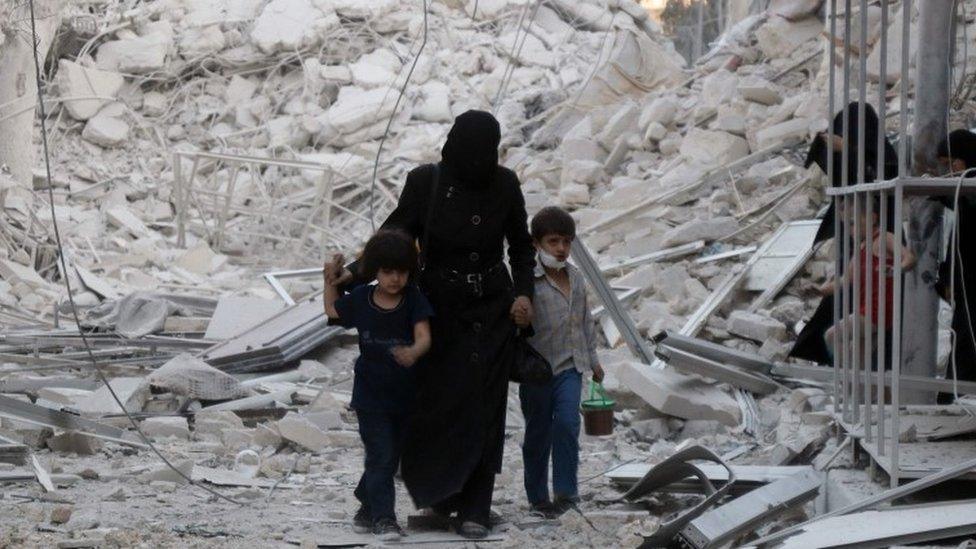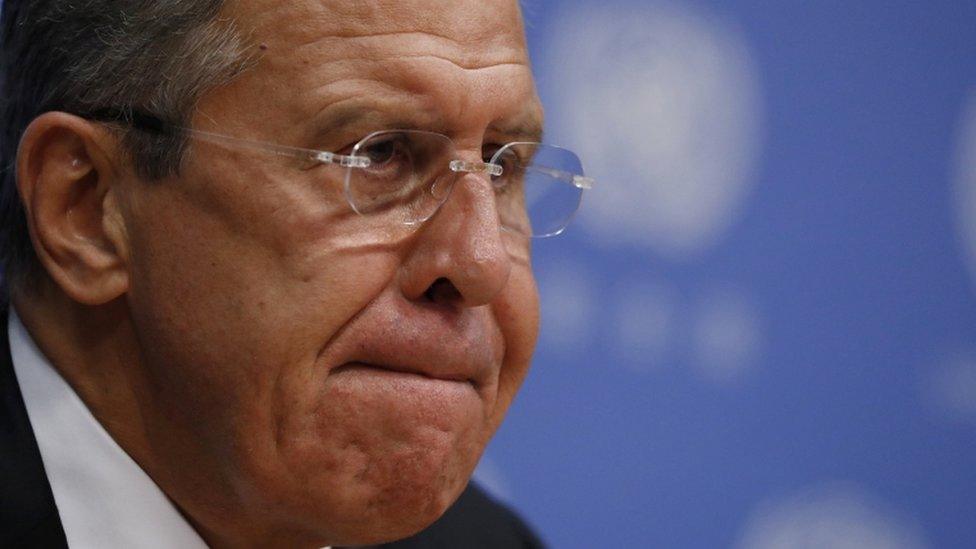Syria conflict: US-Russia plans 'must be saved' - Lavrov
- Published
A baby boy is rescued from the rubble in Aleppo after a second day of heavy bombing, as Quentin Sommerville reports
US and Russian plans to end Syria's conflict must be saved as there is no alternative, Russia's Foreign Minister Sergei Lavrov has told the UN.
He was speaking as the northern city of Aleppo endured a day of relentless air strikes, with the Syrian military determined to retake rebel-held areas.
A seven-day US-Russian brokered truce collapsed on Monday.
Mr Lavrov laid the blame on the US for failing to control the rebel groups it backs.
He said a key condition of the truce was for moderate rebel groups backed by the US to separate themselves from militants.
"Unfortunately the coalition led by the United States, which committed itself to make sure that this separation happens, has not been able to do this," Mr Lavrov said, although he said his "good friend" Secretary of State John Kerry had indicated this remained the commitment of the United States.
Mr Lavrov said that if the location of militants of the Nusra Front could be pinpointed, he remained convinced a cessation of hostilities and a delivery of humanitarian aid would be possible.
He said it was "now essential to prevent a disruption" of the US-Russia agreements.
Civil defence volunteer: "Unprecedented targeting" of Aleppo
Mr Lavrov also spoke of a "bleeding Middle East and North Africa", the result of "arrogant attitudes and feelings of infallibility in pushing unilateral and reckless solutions".
Mr Kerry said he had met Mr Lavrov earlier in the day and that there was "a little bit of progress" on resolving differences on Syria.
"We're evaluating some mutual ideas in a constructive way, period," Mr Kerry said.
But the BBC's diplomatic correspondent James Robbins in New York says there appears to be little hope of any diplomatic progress and that, with the violence in Syria this week, jaw-jaw has absolutely lost out to war-war.

Aleppo has endured a day of devastating air strikes

Mr Lavrov blamed the US for failing to back a key condition of the latest truce
The head of a hospital in the rebel-held east told Reuters news agency that 91 people had been killed in Friday's bombardment.
In between the raids, White Helmet volunteers frantically searched for those trapped in the rubble of demolished buildings, often with bare hands.
Amateur footage shows burning buildings in Aleppo
One video showed a screaming girl being pulled out alive, another was of a toddler with no signs of life.
"In many areas, the wounded and sick have nowhere to go at all - they are simply left to die," said Carlos Francisco, Medecins Sans Frontieres head of mission in Syria.
One White Helmet volunteer reported air strikes as he gave an interview to the BBC World Service.
Another rescue worker described what was happening as "annihilation".
Unicef said that nearly two million people were again without running water after an attack on a pumping station that served the rebel-held east of the city, and the retaliatory shutdown of a station serving the government-controlled west.
The White Helmets said centres set up to help victims of bombardments were being targeted, and three out of four had been put out of action.

Islamic State and the crisis in Iraq and Syria in maps
Ammar al-Selmo, the head of civil defence in eastern Aleppo, told Reuters that at least 40 buildings had been destroyed.
Activists said both Syrian and Russian warplanes were taking part in the offensive, though Russia has not confirmed its involvement.
Announcing the new offensive on state television late on Thursday, the Syrian government warned Aleppo residents to "stay away" from "terrorist positions".
Syrian military sources said a ground offensive would follow.
One told Agence France-Presse that the bombardment "could go on for hours or days before the ground operation starts. The timing of the ground operation will depend on the results of the strikes".